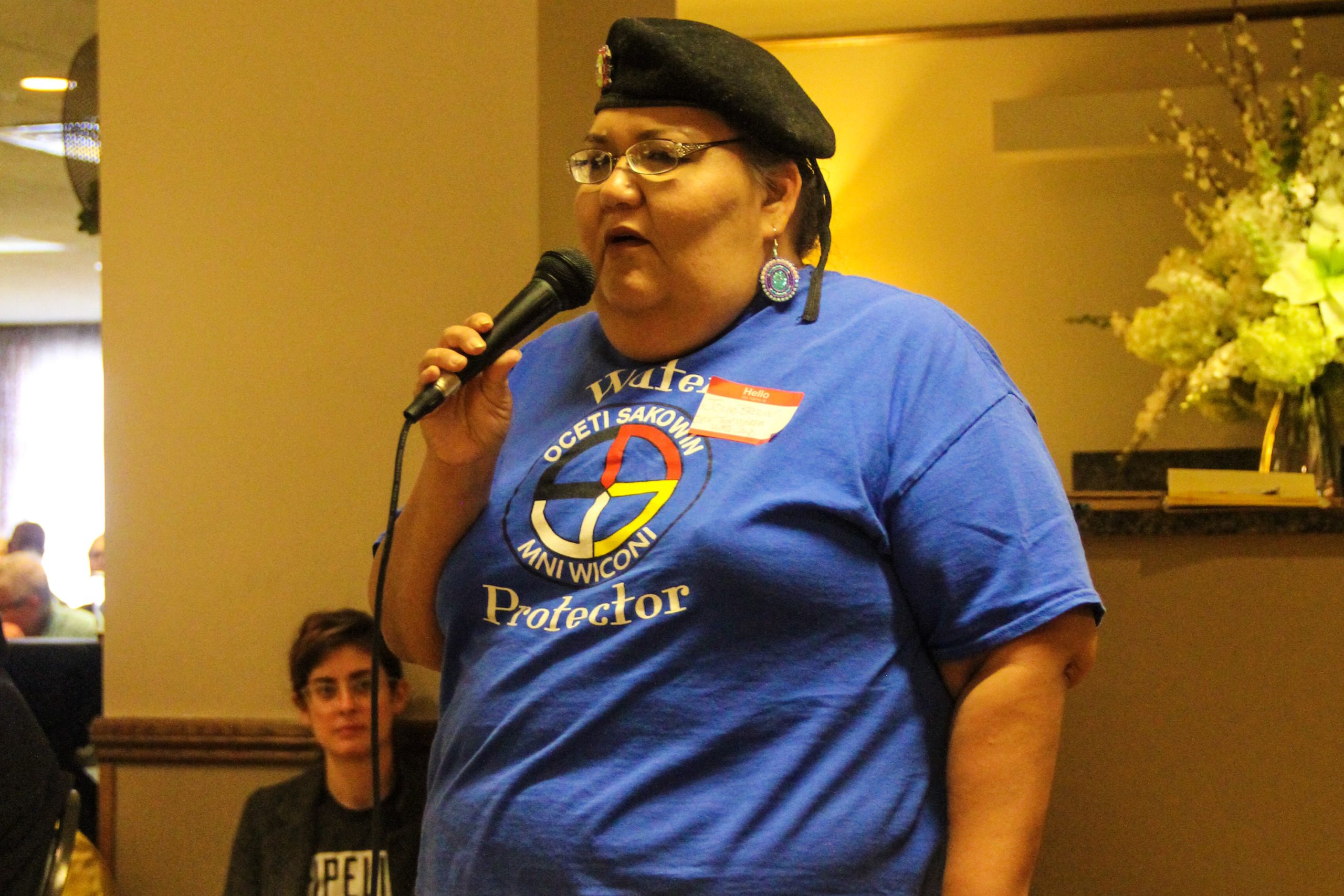Indianz.Com > News > People’s World: Fearless warrior Joye Braun walks on

Water Protector and intrepid warrior Joye Braun passes on
Wednesday, January 11, 2023
People's World
A dauntless advocate of Indigenous justice walked on with the passing of indomitable Water Protector and fearless Warrior Joye Braun. Joye was the National Pipeline organizer for the Indigenous Environmental Network (IEN). She was a member of the Cheyenne River Sioux Tribe of South Dakota and passed away on November 13.
Joye was only 53 when she walked on, but in that short lifetime there was contained a storied calling of dedication, commitment, and warriorship. She was the first to set up her lodge at the Oceti Sakowin camp on April 1, 2016, in the snow, in the Standing Rock protests against the Dakota Access Pipeline (DAPL).
Joye was a leading voice in the climate justice movement. She was a tireless advocate whose opposition to the Keystone XL pipeline was instrumental in its cancellation. Her advocacy led to groundbreaking alliances between Indigenous peoples, climate activists, and landowners.
Joye was also a prominent leader in the People v. Fossil Fuels Coalition, a developing movement of more than 1,200 organizations throughout the U.S. tasked with bringing an end to the fossil fuel era of history.
Albert Bender is a Cherokee activist, historian, political columnist, and freelance reporter for Native and Non-Native publications. He is currently writing a legal treatise on Native American sovereignty and working on a book on the war crimes committed by the U.S. against the Maya people in the Guatemalan civil war He is a consulting attorney on Indigenous sovereignty, land restoration, and Indian Child Welfare Act (ICWA) issues and a former staff attorney with Legal Services of Eastern Oklahoma (LSEO) in Muskogee, Oklahoma.
This article originally appeared on People's World. It is published under a Creative Commons license.
Search
Filed Under
Tags
More Headlines
‘Nothing’s changed. Nothing’s gotten better’: President Trump’s nominee takes on Indian health
Native America Calling: A Mohawk chef on TV and a Native foods cookbook
Cronkite News: Arizona governor promises $7 million for NAGPRA work
Indian Country still on high alert over President Trump’s freeze on federal funding
Native America Calling: Federal funds under fire from President Donald Trump
Native America Calling: Balancing economic safety and development for payday loan businesses on tribal land
‘A step in the wrong direction’: President Trump’s funding freeze shakes up Indian Country
Native America Calling: From road access to ICE immigration raids, tribes are asserting sovereignty
President Trump’s ‘love’ for Lumbee Tribe only goes so far in fight for federal recognition
NAFOA: 5 Things You Need to Know this Week (January 27, 2025)
Chuck Hoskin: Cherokee Nation reaches trust settlement with United States
Native America Calling: Native American representation in television news
Native America Calling: Native youth building the foundation for future leadership
Republicans forced to defend record on Indian issues at start of new Congress
Native America Calling: How it started, how it’s going with Donald Trump
More Headlines
Native America Calling: A Mohawk chef on TV and a Native foods cookbook
Cronkite News: Arizona governor promises $7 million for NAGPRA work
Indian Country still on high alert over President Trump’s freeze on federal funding
Native America Calling: Federal funds under fire from President Donald Trump
Native America Calling: Balancing economic safety and development for payday loan businesses on tribal land
‘A step in the wrong direction’: President Trump’s funding freeze shakes up Indian Country
Native America Calling: From road access to ICE immigration raids, tribes are asserting sovereignty
President Trump’s ‘love’ for Lumbee Tribe only goes so far in fight for federal recognition
NAFOA: 5 Things You Need to Know this Week (January 27, 2025)
Chuck Hoskin: Cherokee Nation reaches trust settlement with United States
Native America Calling: Native American representation in television news
Native America Calling: Native youth building the foundation for future leadership
Republicans forced to defend record on Indian issues at start of new Congress
Native America Calling: How it started, how it’s going with Donald Trump
More Headlines
